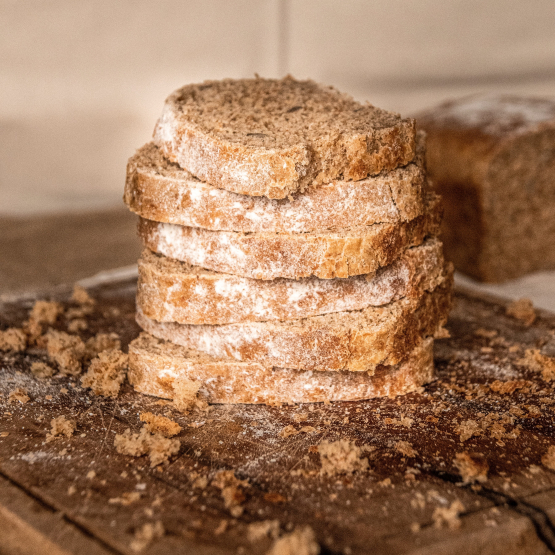Wohin mit alt(backen)em Brot?
Kochkurs auf Deutsch
Wohin mit alt(backen)em Brot?
Inspirationen rund um das Mittelmeer
mit Lisa Shoemaker
Je nachdem, wo man nachschaut, werden in Deutschland zwischen 500.000 und 2 Millionen Tonnen Brot im Jahr weggeschmissen. Jedenfalls viel, bei 500000 t wären es immerhin noch 6,25 kg pro Person pro Jahr. Das kann jedoch wohlschmeckend verhindert werden. Und die Länder rund um das Mittelmeer liefern dafür Steilvorlagen. Italien ist besonders produktiv in Sachen altes Brot in der Suppe: u.a. Ribollita, Acquacotta und Pappa al pomodoro – Brot-Tomaten-Suppe, letztere werden wir zubereiten. Brotsalate sind ebenfalls sehr beliebt: Panzanella in der Toskana, aus dem Libanon kommt Fattoush, Dakos auf Kreta. Fatteh ist eine libanesische Mahlzeit mit geröstetem Fladenbrot(chips), Kichererbsen, Joghurt als Grundlage und wird oft durch weitere Zutaten ergänzt…. Wir nehmen Auberginen und Hackbällchen dazu. Om Ali, eine Art Bread Pudding aus Ägypten. Zugegebenermaßen habe ich das Rezept auf europäisches Gebäck umgewandelt, wir werden altbackene Croissants, Rosinenschnecken usw. verwenden.
Fun fact: Fatteh und Fattoush sind zwei Brotgerichte und offensichtlich miteinander verwandt, wäre es möglich, dass sie auch etwas mit Feta, dem griechischen Käse, zu tun haben? Ehrlich gesagt hatte ich mir diese Frage nie gestellt, aber als ich eines Tages eine Scheibe Feta auf einem griechischen Markt kaufen wollte, überlegte ich, was wohl „Scheibe“ auf griechisch heißt? Mir fiel nur das italienische Wort ein, aber das würde ja nix nützen. Oder doch? Mir klappte die Kinnlade runter: Scheibe heißt auf Italienisch fetta. Klick. Zufällig wusste ich, dass die Seeleute in den Häfen des Mittelmeers im Mittelalter lingua franca („fränkisch“) miteinander sprachen, eine Art pidgin Italienisch, und so verbreitete sich das Wort (meine Theorie).
Menü (beispielhaft):
- Pappa al pomodoro – Brot-Tomaten-Suppe
- Panzanella - Brotsalat aus der Toskana
- Fatoush - Brotsalat aus dem Libanon
- Dakos - Brotsalat aus Griechenland
- Fatteh - Libanesisches Gericht mit geröstetem Fladenbrot, Kichererbsen, Joghurt, Auberginen und Hackbällchen
- Om Ali - Ägyptischer Brotpudding
- Für alles gibt es vegetarische und vegane Optionen

Lisa Shoemaker
Im New York der 80er Jahre beschäftigte sich Lisa eher mit flüssigen Genüssen: Als Bartender mixte sie Cocktails, u. a. im legandären Jazzclub Blue Note. Zur ernsthaften Beschäftigung mit fester Nahrung fand sie Anfang der 90er Jahre, als sie eine Bio-Gemüsekiste abonnierte und so gar nicht wusste, was sie aus all dem Kohl, Steckrüben, Roter Bete und ähnlichem kochen sollte. Bald reihten sich die Kohlköpfe in Schrumpfkopfmanier auf dem Fensterbrett ihrer Küche. Verzweifelung machte sich breit, doch statt die Kiste abzubestellen, sah sie es als Herausforderung und fing an zu experimentieren und bald versorgte sie die Bio-Kisten-Abonnentinnen allwöchentlich mit interessanten Rezepten aus aller Welt.
Lisa Shoemaker hat im Ideenwettbewerb, den das Land Berlin im Rahmen seiner Zero-Waste Strategie 2021 ausgeschrieben hatte, den 2. Platz belegt. Der nachhaltige Umgang mit Lebensmitteln und Energie liegt Lisa sehr am Herzen und sie gibt ihr experimentell erworbenes Wissen in all ihren Kochkursen mit Begeisterung weiter. Und sie kocht natürlich mit Lebensmitteln aus Bio-Anbau, möglichst saisonal und regional, wo immer es geht.
- Pappa al pomodoro – Brot-Tomaten-Suppe
- Panzanella - Brotsalat aus der Toskana
- Fatoush - Brotsalat aus dem Libanon
- Dakos - Brotsalat aus Griechenland
- Fatteh - Libanesisches Gericht mit geröstetem Fladenbrot, Kichererbsen, Joghurt, Auberginen und Hackbällchen
- Om Ali - Ägyptischer Brotpudding
- Für alles gibt es vegetarische und vegane Optionen
Kundenrezensionen
Für diesen Artikel wurden noch keine Bewertungen abgegeben. Es würde uns freuen, wenn du die erste Bewertung schreibst.

